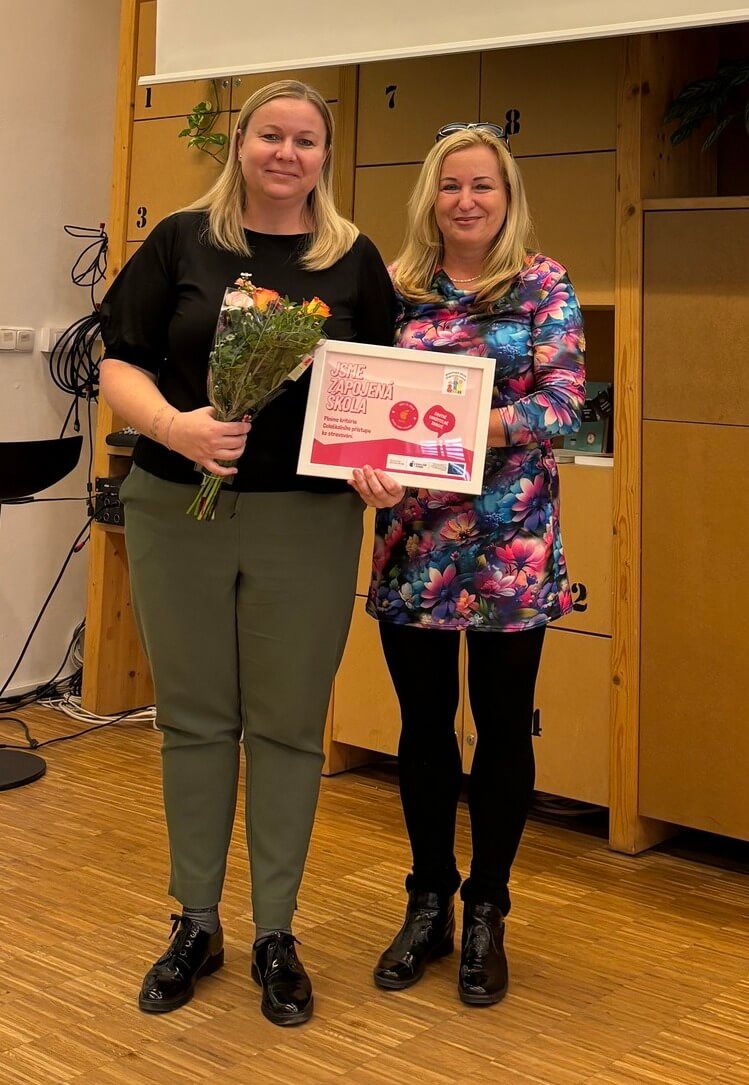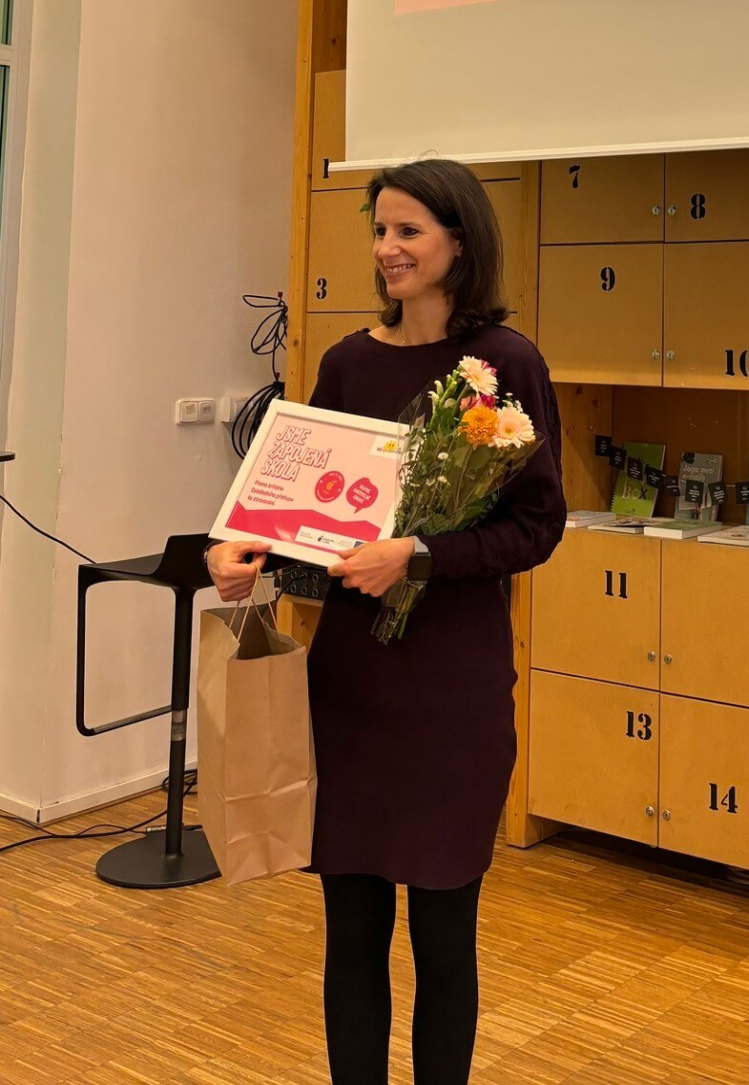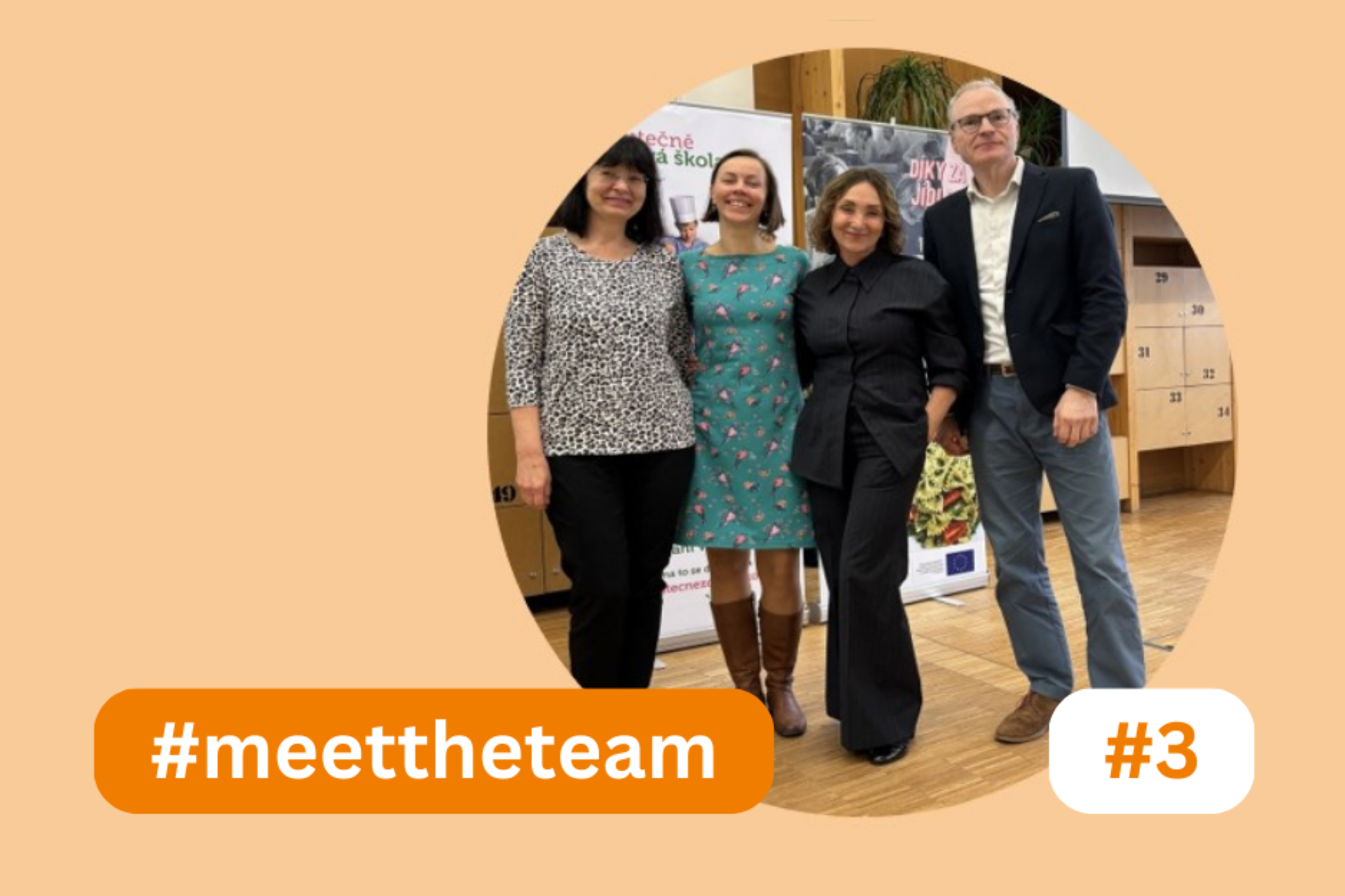MEET TOM, DIRECTOR OF SKUTeČNĚ ZDRAVÁ ŠKOLA (“A REALLY HEALTHY SCHOOL”)!
AND MEET LUDMILLA AND HANA, TWO HEADMISTRESSES OF CZECH KINDERGARTENS.
More and more schools, partnering with SchoolFood4Change, across Europe are currently implementing the Whole School Food Approach (WSFA). While the overarching aim is to generally devote more attention to food education and healthy nutrition in the school environment, there are concrete criteria that schools and kindergartens can follow for orientation at the implementation level. And, on the basis of these criteria, commitment is rewarded! Participating schools that successfully implement the criteria can apply for bronze, silver or gold status and receive a SchoolFood4Change medal to showcase their achievement.
We are delighted to announce that two Czech SchoolFood4Change partner schools have already reached WSFA Bronze level!
This is a great achievement of the Czech project partner “Skutečně zdravá škola” and of course the schools and kindergartens themselves.
Let’s meet and greet Tom, Ludmilla and Hana!
SF4C: Hi Tom! Tell us – what challenges did you face when working with schools/ kindergartens and how did you overcome them?
Tom: The biggest challenge was explaining the benefits of participating in another project and getting the schools to engage with the WSFA criteria. At first the schools were hesitant, but after studying the criteria and some explanations from us, the schools were willing to participate.
SF4C: You have a lot of experience in collaborating with schools and kindergartens. What advice would you give to other organisations and people who want to support schools in the change process?
Tom: My advice is to start with a few, most eager pilot schools (and people!). Help them implement the WSFA and then share their good practices, knowledge and experience with other schools.
SF4C: So, with regards to the WSFA, what have you achieved that makes you proud?
Tom: I am very proud that SchoolFood4Change builds on the WSFA and that the WSFA is now being spread, as a concept, around Europe. In the Czech Republic, we’ve been using and implementing this concept since 2015 with great success!
SF4C: Thank you, Tom!
SF4C: Hi Ludmilla and Hana! You both encountered SchoolFood4Change and the Whole School Food Approach through Tom and his organisation. Tell us, when you saw the WSFA criteria (bronze) for the first time, what was the first thing that came to your mind?
Ludmilla: Yes, we have been collaborating with Skutečně zdravá škola since 2018. So, when we found out about SchoolFood4Change, we did not hesitate to join this initiative. Our first thought, when we saw the criteria: “What have we got ourselves into?!”. We saw it as a challenge to prove that we are actually meeting the criteria. We already do a lot of things routinely, but we don’t always document everything.
Hana: We found the criteria difficult at first, but after reading through them carefully, we realised that we are already doing a lot in this area. Still a little unsure as to whether we could really make it, we filled in the application form. And now we are glad that we did!
SF4C: Was it challenging to implement the activities related to meeting the SchoolFood4Change bronze criteria? If so, what challenges did you face and how did you overcome them?
Ludmilla: Looking back, it was not too difficult. For us, it was very important to reconvene several times as a team to clarify our goals and vision, but also our options. Communicating, both with the school team and with the public, is very important. We need a shared vision, and everyone needs to contribute. It was, for example, a big challenge to get parents involved. Some parents understand, why it is important to teach children about the origins of food and the benefits of good food for our health. However, on the other hand, there are parents who get involved and participate in dialogues with us and still offer their children unhealthy food again and again.
Hana: I agree! The criteria “The school educates parents to give their children healthy and sustainable snacks for lunch” is challenging! We try to open the parents’ eyes and introduce them to our vision through workshops with the nutritionist. I think it’s getting better every year. Gradually the parents are coming on board and are keen to work with us. Now, I think, more than 50% of the parents now work with us.
SF4C: What activities are taking place or being implemented in your nursery that contribute to better food education and/or healthier and more sustainable (school) meals for children?
Hana: We have been consulting with a nutritional therapist on our menus for a year now. We organise workshops with the nutritional therapist, invite farmers from the region, offer parents the opportunity to buy from our local suppliers, organise farm visits and involve parents in our gardening work. Parents can try samples of our spreads, our own baked goods and salads. We also offer both staff and parents cooking workshops with chefs. We work with chef Roman, who shows the children how to prepare healthy dishes (e.g. fruit plates, smoothies, salads), always involving the children and explaining the origin of the ingredients. Teachers regularly attend parent-teacher conferences on healthy eating and local food and undergo further training to incorporate these topics into the curriculum. Seasonal foods, gardening, eating out, tap water, food waste, composting, etc. are all part of our curriculum. We are constantly adding to and improving these topics.
Ludmilla: Our canteen staff regularly participates in trainings and workshops together with staff from other kindergartens. On top of that, we focus on activities related to the education and awareness of children. We are, for example, cooperating with a farmer, our supplier of milk and dairy products from nearby Děčany. The children are in contact with the farmer via WhatsApp. They listened to a short story about life on the farm and took a virtual tour of the farm. During a visit to the farm, the children had the opportunity to see the animals, look after them, go shopping and taste fresh milk and cheese. In the kindergarten, they cooked with the ingredients they had bought in collaboration with the school kitchen.
For us, the cooperation of all actors – the school kitchen, teachers, children and parents – is really important. That’s why everyone is often involved in our projects.
SF4C: So, with regards to the WSFA, what have you achieved that makes you proud?
Ludmilla: For us, it is already a success that we have managed to bring the topic of healthy eating into the kindergarten. I am proud of the teachers, who with great effort are passing on knowledge to the children. And an important part of this mosaic is the school kitchen: the canteen staff had to learn to cook with local food. They now regularly bake pastries and create colourful meals with healthy ingredients. I am also proud of our school garden, which is being transformed into a fruit and vegetable garden and is a real meeting place for the whole community. Children, parents and teachers grow and harvest great produce here, which is then used in the school kitchen. And I’m also proud that our work has been recognised – a silver award from Really Healthy Schools and a bronze award from SchoolFood4Change!
Hana: Yes, and we’re really proud of our older children who already know how to eat good food, how to choose fresh vegetables and fruit, what it’s like to grow it, how to take care of it, they know where the dairy farm is in their area, where the meat farm is, they know what it’s like to be a farmer, they know which foods are seasonal, they know the concept of local and sustainability. The feedback we get from the kids and then from the parents (as the kids tell at home) is a huge success for us.
Parents are getting more and more involved. They ask what our next plans are, how they can help us, attend our workshops, read and share our menus and appreciate all we are trying to do. They bring us surpluses from their gardens.
And we are proud of the great collaboration with other schools and nurseries (Veltěze, Dobroměřice). We join forces to create a bigger demand for the farmers, to organise farm visits and farmers’ markets, as well as workshops.
Thank you, Ludmilla and Hana, for the interview and for giving us an insight into your everyday school / kindergarten life! Congratulations on what you have achieved!


